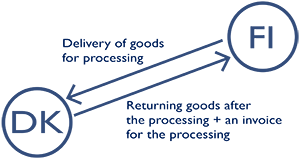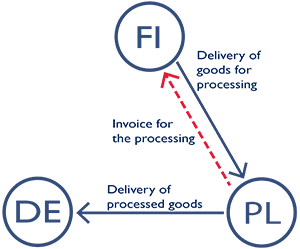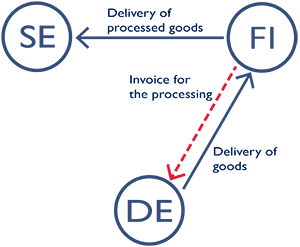Processing of goods under contract refers to cases where goods, usually raw material or semi-finished products, are delivered to another Community country for processing or continued processing. An agreement has been reached with a foreign manufacturer on the processing of the raw material. In paid employment, the ownership of goods or raw material does not change. The value of the additional material used in manufacturing and other manufacturing costs of the goods are charged from the processor. After processing, the goods will be sent to the client or another customer if agreed. In addition to the raw material, the processor's own material can be used in the process.
Goods delivered for processing under contract are declared using code 41 if the goods are returned or are assumed to be returned to the Member State where they were originally dispatched. Code 42 is used if the goods are not returned or are not assumed to be returned to the Member State of dispatch. Goods that are returned after processing are declared using code 51 if they are returned to the Member State of dispatch. Code 52 is used if the goods are not returned to the Member State of dispatch. The same codes can be used both for arrivals and dispatches.
Example 1: The Finnish company FI is obliged to provide information on both dispatches and arrivals. FI delivers goods for processing to the Danish company DK, and FI and DK agree that the goods will be returned to Finland after processing.

Example 2: The Finnish company FI is obliged to provide information on both dispatches and arrivals. FI delivers goods for processing to the Polish company PL, and FI and PL agree that the processed goods will be delivered directly to FI’s warehouse in Germany.

The goods are reported according to physical movement. If the company does not have a notification obligation according to the direction of delivery (arrivals or dispatches), this delivery will not be reported.
Example 3: The Finnish company FI is obliged to provide information on dispatches only. FI delivers goods for processing to the Danish company DK, and FI and DK agree that the goods will be returned to Finland after processing.
The invoicing value of goods delivered for processing is the value according to the time of delivery of the goods. The delivered goods are recorded at their current value. When the goods are returned after processing, the invoice value is the value of the goods plus the amount of additional wage labour and other costs according to the invoice.
Example 4: The German company DE has sold goods to the Swedish company SE. The goods are delivered to the Finnish company FI for processing. After the processing FI delivers the goods to Sweden and sends an invoice for the processing to DE. The Finnish company FI is obliged to provide information on both dispatches and arrivals.

For arrivals, the Member State where the processing has taken place is declared as the country of origin of goods processed under contract. Finland (FI) is declared as the country of origin for dispatches.
As a result of processing under contract, the CN8 code often changes. Examples of processing under contract:
Example 5: A Finnish company (FI) exports linen fabric (5309 29 00) to Estonia, where tablecloths are sewn from it. Tablecloths (6302 59 10) are imported to Finland after manufacture. The Finnish company is required to provide information on imports and exports.
If the company delivers goods to be used in the processing, the transaction code is either 11 or 99.
Example 6: A Finnish company exports mineral water (2201 10 11) to Estonia for bottling. In addition to the liquid, the consignment includes crown caps (8309 10 00) with the Finnish company’s own logo, which are used to close the bottles.